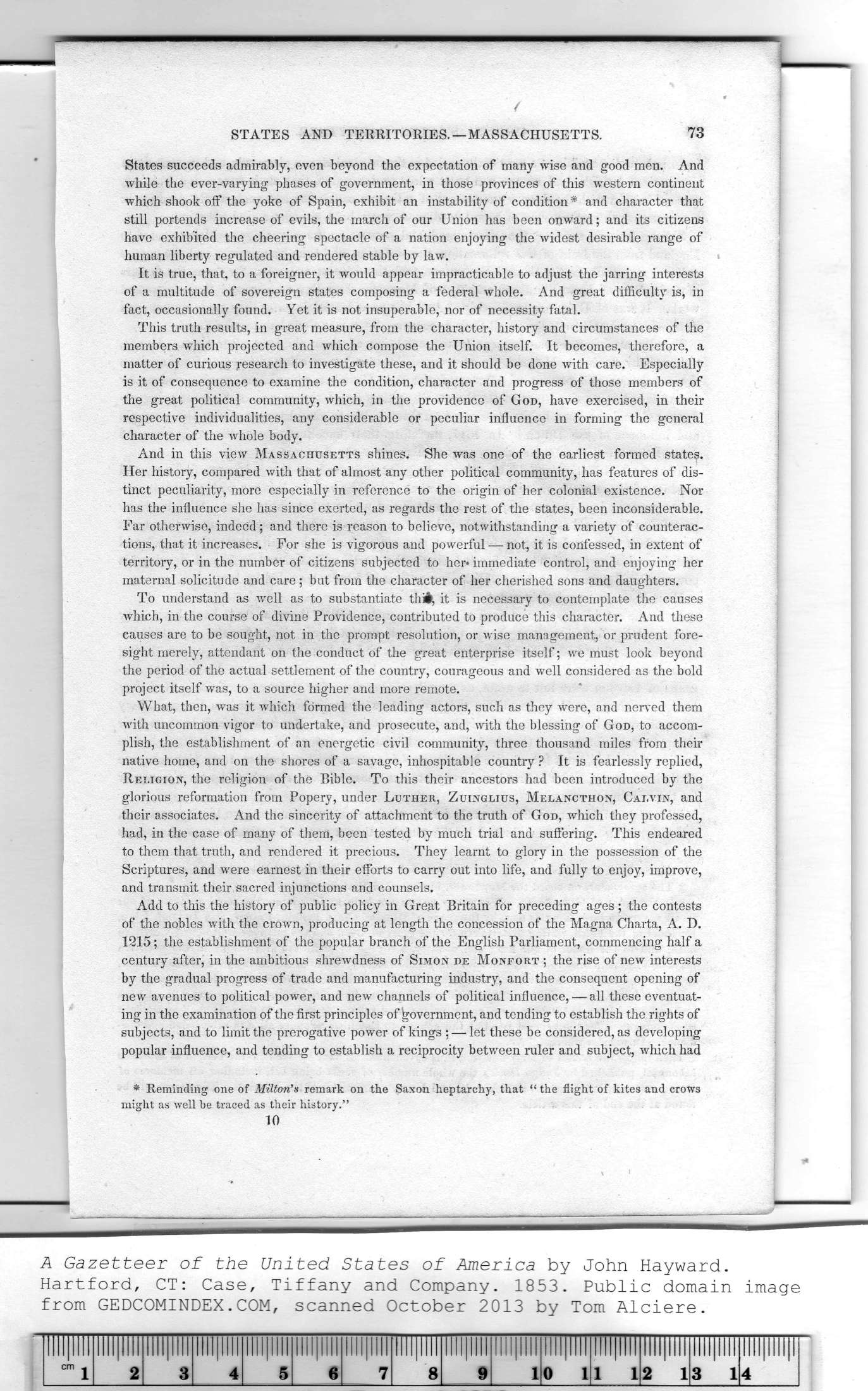|
|
Note: Ctrl and + increases the font size of the text below, Ctrl and - decreases it, and Ctrl and 0 resets it to default size.
STATES AND TERRITORIES.—MASSACHUSETTS. 73
States succeeds admirably, even beyond the expectation of many wise and good men. And
while the ever-varying phases of government, in those provinces of this western continent
which shook off the yoke of Spain, exhibit an instability of condition 1 and character that
still portends increase of evils, the march of our Union has been onward; and its citizens
have exhibited the cheering spectacle of a nation enjoying the widest desirable range of
human liberty regulated and rendered stable by law.
It is true, that, to a foreigner, it would appear impracticable to adjust the jarring interests
of a multitude of sovereign states composing a federal whole. And great difficulty is, in
fact, occasionally found. Yet it is not insuperable, nor of necessity fatal.
This truth results, in great measure, from the character, history and circumstances of the
members which projected and which compose the Union itself. It becomes, therefore, a
matter of curious research to investigate these, and it should be done with care. Especially
is it of consequence to examine the condition, character and progress of those members of
the great political community, which, in the providence of God, have exercised, in their
respective individualities, any considerable or peculiar influence in forming the general
character of the whole body.
And in this view Massachusetts shines. She was one of the earliest formed states.
Her history, compared with that of almost any other political community, has features of dis-
tinct peculiarity, more especially in reference to the origin of her colonial existence. Nor
has the influence she has since exerted, as regards the rest of the states, been inconsiderable.
Far otherwise, indeed; and there is reason to believe, notwithstanding a variety of counterac-
tions, that it increases. For she is vigorous and powerful — not, it is confessed, in extent of
territory, or in the number of citizens subjected to her* immediate control, and enjoying her
maternal solicitude and care; but from the character of her cherished sons and daughters.
To understand as well as to substantiate thi#, it is necessary to contemplate the causes
Avhich, in the course of divine Providence, contributed to produce this character. And these
causes are to be sought, not in the prompt resolution, or wise management, or prudent fore-
sight merely, attendant on the conduct of the great enterprise itself; we must look beyond
the period of the actual settlement of the country, courageous and well considered as the bold
project itself Avas, to a source higher and more remote.
What, then, Avas it Avhich formed the leading actors, such as they Avere, and nerved them
with uncommon vigor to undertake, and prosecute, and, Avith the blessing of God, to accom-
plish, the establishment of an energetic civil community, three thousand miles from their
native home, and on the shores of a savage, inhospitable country ? It is fearlessly replied,
Religion, the religion of the Bible. To this their ancestors had been introduced by the
glorious reformation from Popery, under Luther, Zuinglius, Melancthon, Calvin, and
their associates. And the sincerity of attachment to the truth of God, which they professed,
had, in the case of many of them, been tested by much trial and suffering. This endeared
to them that truth, and rendered it precious. They learnt to glory in the possession of the
Scriptures, and Avere earnest in their efforts to carry out into life, and fully to enjoy, improve,
and transmit their sacred injunctions and counsels.
Add to this the history of public policy in Great Britain for preceding ages; the contests
of the nobles with the crown, producing at length the concession of the Magna Charta, A. D.
1215; the establishment of the popular branch of the English Parliament, commencing half a
century after, in the ambitious shreivdness of Simon de Monfort ; the rise of neAv interests
by the gradual progress of trade and manufacturing industry, and the consequent opening of
neiv avenues to political poAver, and neAv channels of political influence, — all these eventuat-
ing in the examination of the first principles of government, and tending to establish the rights of
subjects, and to limit the prerogative poiver of kings ; — let these be considered, as developing
popular influence, and tending to establish a reciprocity between ruler and subject, Avhich had
A Gazetteer of the United States of America by John Hayward.
Hartford, CT: Case, Tiffany and Company. 1853. Public domain
1
Reminding one of Milton's remark on the Saxon heptarchy, that “ the flight of kites and crows
might as Ai'ell be traced as their history."
10
|
